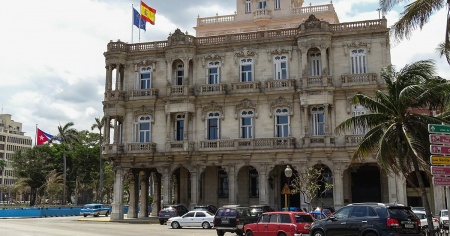Almost half a million descendants of Spanish emigrants could see their dream of obtaining nationality thwarted due to the administrative collapse affecting Spanish consulates in Latin America and the United States, particularly in places like Havana, where the situation is critical and delays are more severe.
According to the newspaper El País, since the approval of the Democratic Memory Law in 2022, around 680,000 people have applied for Spanish nationality, but only 30% of those applications have been processed.
More than 474,000 applications remain pending, and the consulates, overwhelmed by demand, acknowledge in their communications to applicants that the wait could exceed several months or even years, due to a lack of human resources and means.
The situation in Cuba, particularly at the General Consulate of Spain in Havana, illustrates the seriousness of the problem.
Despite this office managing to register nearly 56% of the 87,000 applications received, the highest percentage among major consulates, the delays in initial access to the process are alarming, the Spanish newspaper noted.
Currently, those who submit their application via email to initiate the process receive an automated response notifying them of a wait time of up to 10 months just to obtain the necessary credentials to request an in-person appointment.
Organizations such as the Association of Spanish Descendants Worldwide (ADEM) have described the situation in Havana as "critical."
Its president, Estela Marina Pérez, has reported that many Cuban applicants not only wait nearly a year to obtain their credentials but also risk being excluded from the process if they fail to complete their files within the validity period of the law, which ends in October 2025.
The severity of the delays has led to multiple complaints filed with the Ombudsman, the Spanish institution responsible for safeguarding citizens' rights against the Administration, and has even given rise to a black market for appointment selling, where alleged agents offer slots in exchange for payments ranging from 80 to 200 euros.
Additionally, it has been documented that failures in the appointment assignment system have left hundreds of applicants without credentials, with no effective solution provided so far.
Although the Ministry of Foreign Affairs of Spain has strengthened the consulate in Havana by increasing its staff by 35% and has announced the upcoming implementation of a new digital tool to streamline appointments, the Ombudsman warns that structural issues persist and the volume of complaints remains high.
The backlog, however, is not limited to Cuba. In São Paulo (Brazil), one of the consulates with the highest volume of applications, only about 4.5% of the nearly 55,000 requests received have been processed.
Consulates in Mexico, Miami, Bogotá, and Montevideo are also experiencing significant delays, although some have begun to implement systems to confirm appointment requests within the legal timeframe, a measure that has yet to be fully applied in Havana.
The history of Spanish nationality for the descendants of emigrants could become, for many Cubans and Latin Americans, a lost opportunity if urgent measures are not taken to resolve the consular backlog in the coming months.
As a temporary measure, the Consulate General of Spain in Havana announced that starting from May 5, there will be a increase of 336 weekly appointments available for the submission of applications under the Law of Democratic Memory (LMD).
The official announcement of the measure was made on April 25, on its profile on the social network X. The new appointments available for the submission of applications represent a 27.2% increase in service capacity, according to the diplomatic office.
The news has been received with enthusiasm by many Cuban descendants who aspire to obtain Spanish nationality, seeing this expansion as an opportunity to advance their applications.
Frequently Asked Questions about the Crisis in Spanish Consulates and the Law of Democratic Memory
How many applications for Spanish nationality are pending due to the collapse of the consulates?
More than 474,000 applications for Spanish nationality are pending processing, primarily in consulates across Latin America and the United States, with particular severity in places like Havana.
What is the current situation at the Spanish Consulate in Havana?
The Spanish Consulate in Havana is facing significant delays in accessing nationality processes, with waits that can exceed 10 months just to obtain the necessary credentials to request an in-person appointment.
What measures are being taken to address the collapse at Spanish consulates?
The General Consulate of Spain in Havana has announced a 27.2% increase in the number of weekly appointments starting from May 5, and the Ministry of Foreign Affairs has strengthened the staff by 35% and plans to implement a new software tool to streamline the appointment process.
What problems do Cuban applicants face under the Law of Democratic Memory?
Cuban applicants face long waits and a lack of necessary credentials to schedule appointments, which puts their opportunity to obtain Spanish citizenship at risk before the law expires in October 2025.
What is the deadline for submitting applications under the Law of Democratic Memory?
The deadline to submit applications is October 22, 2025, but those who manage to secure an appointment before that date will be able to complete their process even beyond 2025, potentially until 2028, thanks to the new digital system.
Filed under:
